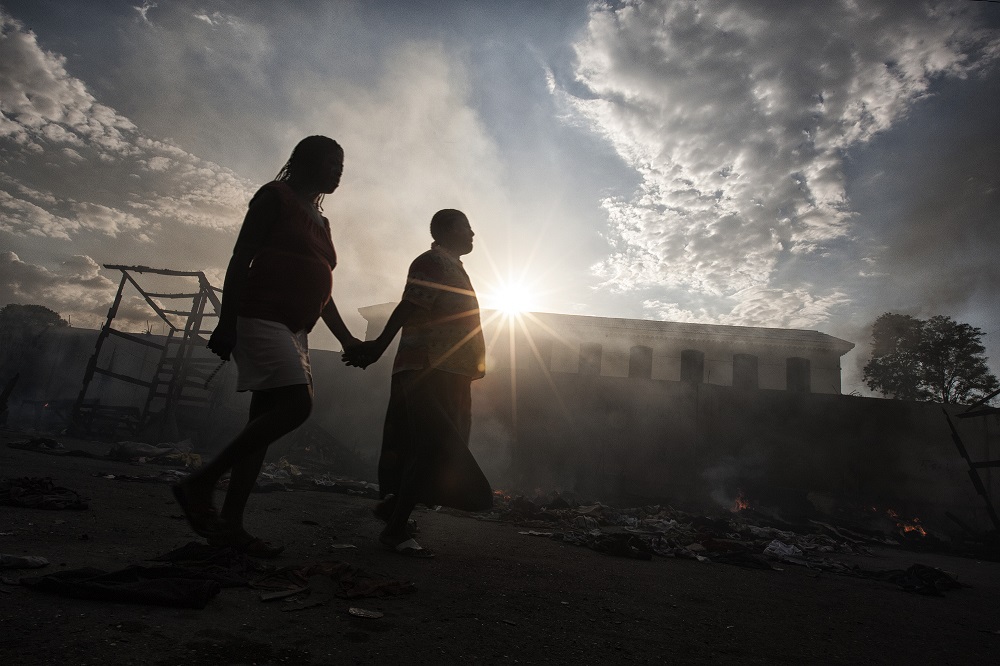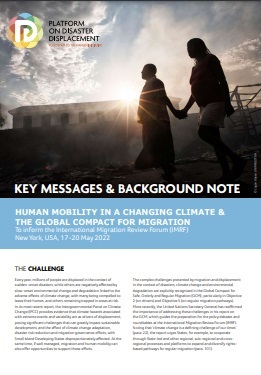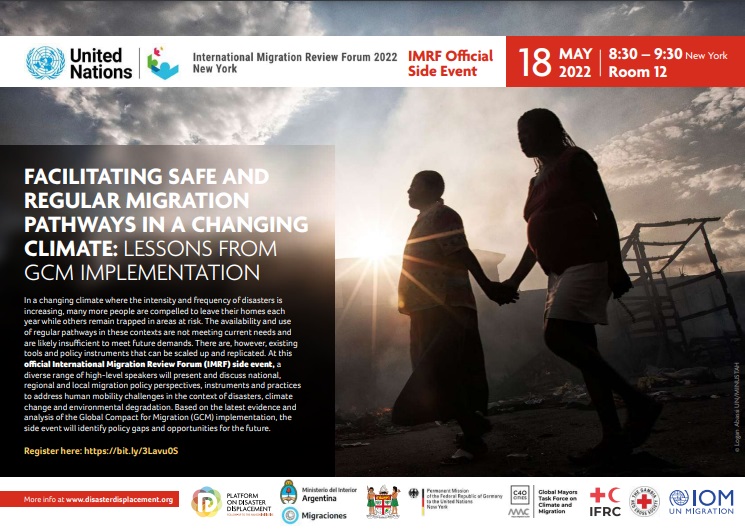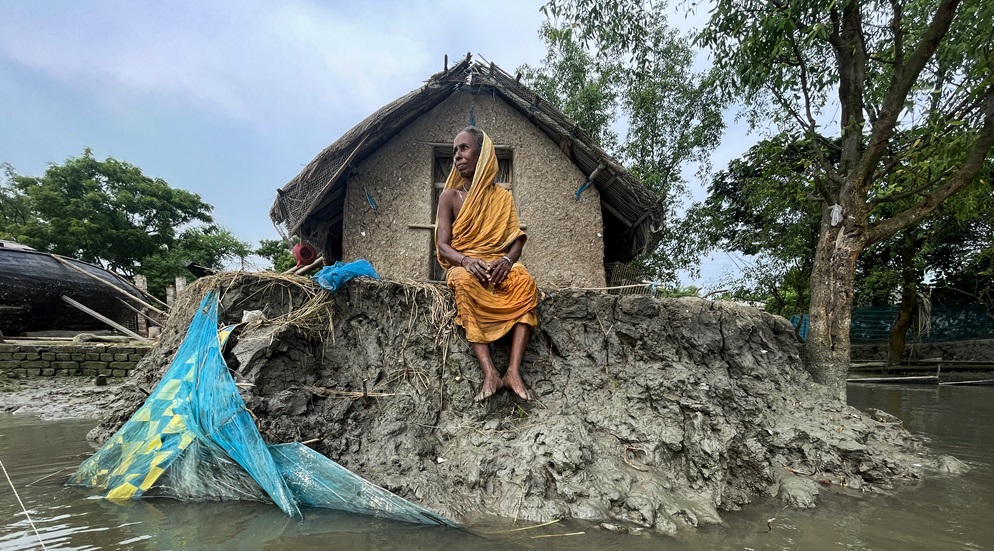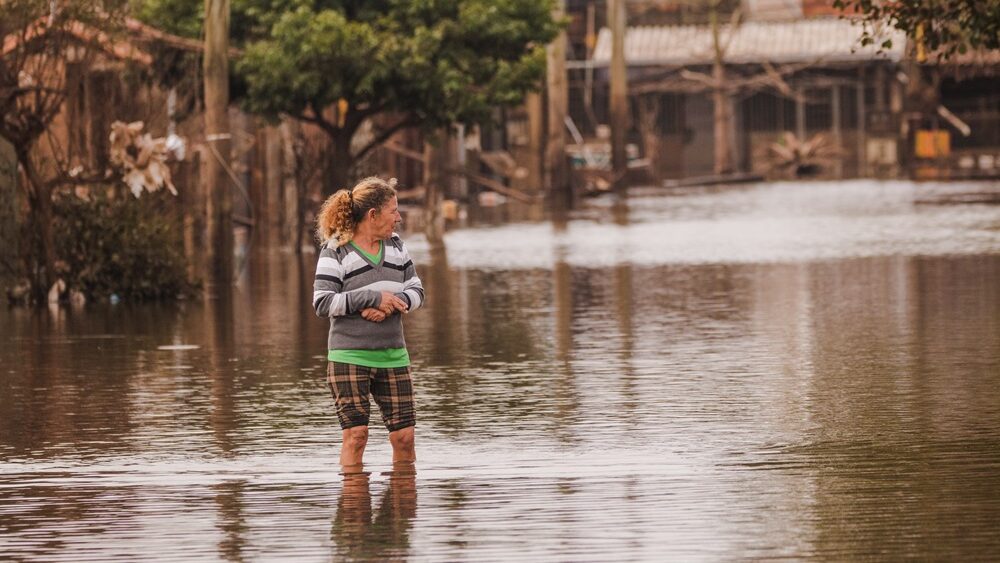Key Messages & Background Note
Human Mobility in a Changing Climate & The Global Compact for Migration
To inform the International Migration Review Forum (IMRF), New York, USA, 17-20 May 2022
The Challenge
Every year, millions of people are displaced in the context of sudden-onset disasters, while others are negatively affected by slow-onset environmental change and degradation linked to the adverse effects of climate change, with many being compelled to leave their homes, and others remaining trapped in areas at risk. In its most recent report, the Intergovernmental Panel on Climate Change (IPCC) provides evidence that climate hazards associated with extreme events and variability act as drivers of displacement, posing significant challenges that can greatly impact sustainable development, and the effect of climate change adaptation, disaster risk reduction and migration governance efforts, with Small Island Developing States disproportionately affected. At the same time, if well managed, migration and human mobility can also offer opportunities to support these efforts.
The complex challenges presented by migration and displacement in disaster and climate change contexts are explicitly recognized in the Global Compact for Safe, Orderly and Regular Migration (GCM), particularly in Objective 2 (on drivers) and Objective 5 (on regular migration pathways). More recently, the United Nations Secretary General has reaffirmed the importance of addressing these challenges in his report on the GCM, which guides the preparation for the policy debates and roundtables at the International Migration Review Forum (IMRF). Noting that ‘climate change is a defining challenge of our times’ (para. 22), the report urges States, for example, to cooperate through State-led and other regional, sub-regional and cross-regional processes and platforms to expand and diversify rights-based pathways for regular migration (para. 101).
The Opportunity
In December 2018, Member States of the United Nations adopted the Global Compact for Safe, Orderly and Regular Migration (GCM), a historical non-binding international agreement proposing for the first time a common and comprehensive approach to managing international migration aligned with obligations and principles under international law and policy frameworks. Among other issues, the GCM includes several specific commitments to address the drivers that compel people to leave their countries of origin in the context of disasters, the adverse effects of climate change and environmental degradation, and to protect and assist those who leave their countries in these contexts. It thus constitutes the first-ever inter-governmentally negotiated agreement on international migration formally recognizing the linkages between migration and different forms of human mobility on the one hand, and climate change, disasters and environmental degradation on the other. The Compact also explicitly recognizes the Nansen Initiative Agenda for the Protection of Cross-Border Displaced Persons in the Context of Disasters and Climate Change (Protection Agenda) and the work of the Platform on Disaster Displacement (PDD) as relevant for developing and implementing coherent approaches to the challenges of human mobility in the context of disasters, environmental change and the adverse effects of climate change.
Four years following its launch, the International Migration Review Forum (IMRF) in May 2022 represents an important opportunity to reaffirm commitment to address human mobility challenges in the context of disasters, the adverse effects of climate change and environmental degradation in line with international standards and at different levels of implementation (sub-national, national, regional and global). It is also an opportunity for the PDD and its Steering Group to highlight progress, identify challenges and provide recommendations based on the Nansen Initiative Protection Agenda and from the current work of the PDD by informing and contributing to the content of the Progress Declaration that will be adopted at the IMRF and guide the implementation of the GCM until the next Forum.
Key Messages
1. Reaffirm the relevance of the GCM in addressing human mobility challenges in disaster and climate change contexts
- Responding to the challenges posed by human mobility in the context of disasters and the adverse effects of climate change require implementation of action and development of policy instruments that address the drivers that compel people to leave their country of origin in the context of disasters, the adverse effects of climate change and environmental degradation, and protect and assist those who leave their countries in these contexts.
- The IMRF is an important opportunity to reaffirm the relevance of international cooperation and coordination between actors working in the fields of migration, disaster risk reduction and climate change action, development, human rights and humanitarian action and to take into consideration relevant recommendations from State-led consultative processes, such as the Nansen Initiative Protection Agenda and the Platform on Disaster Displacement.
2. Recognize the need for further strengthening and investing in better evidence, knowledge, data and analysis
Much progress has been achieved to date on strengthening and investing in better evidence, knowledge, data and analysis, including through programmatic interventions funded under the Migration Multi-Partner Trust Fund. Looking ahead, the IMRF provides an opportunity to further strengthen commitments to fill knowledge gaps, including by:
- further strengthening joint analysis and sharing of information, particularly through regional cooperation and joint research, to better understand, predict and address migration movements and the risk of displacement in disaster and climate change contexts; and
- investing in early warning and contingency planning at the regional and sub-regional levels and improving the quality of forecasting for a better understanding of the risks associated with hazards, their associated impacts on lives/livelihoods of local communities, and strategies to prepare for these impacts.
3. Encourage Member States to build on existing national and regional effective practices to enhance the availability and flexibility of safe, orderly and regular migration pathways in disaster and climate change contexts
The IPCC Report outlined that at progressive levels of global warming, more migration and displacement from regions with high exposure and low adaptive capacity would occur. The availability and use of regular pathways in these contexts are not meeting current needs and are likely insufficient to meet future demands. There are, however, existing tools and policy instruments on migration pathways that could be scaled up and replicated, such as the use of humanitarian visa for people displaced across borders in disaster-contexts. The IMRF and the Progress Declaration should encourage Member States to build on this progress and consider significantly scaling up action, including by:
- reviewing existing domestic legislation, policies and strategies to determine to what extent they allow for the temporary admission, stay or non-return for people compelled to leave their country in disaster and climate change contexts, in a consistent manner with other relevant frameworks and in cooperation with relevant actors and mandates; and
- considering the use of humanitarian protection measures to create and expand safe pathways and opportunities for regular migration in disaster and climate change contexts, including through regular immigration law, exceptional immigration categories, or provisions related to norms of international human rights law; and
- ensuring the respect of the human rights of those admitted, and if needed, that they have access to basic assistance, including: shelter, food, medical care, education, livelihoods, security, family unity, and respect for social and cultural identity; and
- strengthening cooperation to identify, develop and strengthen solutions for persons compelled to leave their countries of origin owing to disasters and the adverse effects of climate change.
4. Strengthen governance frameworks
The IMRF and the Progress Declaration should seek to strengthen governance frameworks by investing in capacity-building of regional and sub-regional entities and greater policy coherence to address the protection needs of people displaced across borders in the context of disasters and climate change, including by:
- developing regional protection and human mobility frameworks and scaling up/replicating regional agreements governing the freedom of movement of people in disaster situations, in cooperation with existing frameworks and actors covering other forms of human mobility and in line with their mandates; and
- promoting strategic, multi-donor approaches, such as flexible funding instruments and multi-year funding cycles, to support responses to disaster displacement and for finding lasting solutions; and
- enhancing policy coherence and coordination for the implementation of the GCM and other applicable frameworks, including the United Nations Framework Convention on Climate Change and the Paris Agreement, and the commitments under the Sendai Framework for Disaster Risk Reduction 2015-2030, in line with the 2030 Agenda for Sustainable Development and its Sustainable Development Goals (SDGs).
5. Strengthen voluntary monitoring and review efforts
For more effective monitoring and evaluation of the implementation of commitments over time, and more evidence-based policy development, the IMRF and the Progress Declaration should strengthen and support voluntary monitoring and review efforts through the collection, analysis and use of data and indicators, using available guidance such as the “Analytical Framework for Monitoring and Reporting on the Implementation of GCM commitments related to Addressing Human Mobility Challenges in Disaster and Climate Change Contexts”, which was developed as part of the UN Migration Network Workplan 2021-22, specifically under Thematic Priority 4 on Climate Change and Migration.
“Being admitted to and being allowed to stay in a country where life-saving assistance can be reached is often a primary need for people forced to move across borders in the context of disasters and adverse effects of climate change.”
Prof. Walter Kaelin, Envoy of the Chair of the Platform on Disaster Displacement
Cover photo: © UN/MINUSTAH

